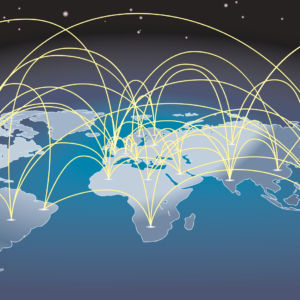“Tariffs. I want tariffs.” These were President Trump’s words regarding trade with China in a meeting with senior advisers in late August. Throughout the campaign and his presidency, he has frequently cited the United States’ $204 billion trade deficit with China as a chief justification for more-restrictive trade policies.
Trump has characterized free trade as zero-sum game, pitting one country against the other for a winner-takes-most-of-the-world’s-wealth prize. But this perspective is grossly distorted.
A country’s trade balance is not an indicator of its economic success or failure. In essence, America’s trade deficit means that American consumers are getting value from consuming goods made abroad, American producers are getting value from using inputs made abroad, and non-Americans are investing in the United States.
Neil Erwin, senior economics correspondent of The New York Times, describes the United States’ trade balance this way:
“It’s true that the United States has a $58 billion trade deficit with Mexico, for example. But it’s not as if Americans were just flinging money across the Rio Grande out of charity. Americans get a lot of good stuff for that: avocados, for example, and Cancun vacations.”
Trading with China, or with Mexico for that matter, does not mean that Americans lose; rather, Americans receive desirable goods and services in return for those dollars.
Restricting trade on the basis of a trade deficit is foolish. The way that the trade balance is calculated is too limited in scope to represent fully Americans’ trade activities. When the United States’ $4.4 trillion of foreign investments are included in the calculation, the trade deficit closes, portraying a more complete picture of our nation’s trade standing than the popularly cited figure.
Trump should cease calling for tariffs, and here’s why:
Chinese goods are created there for a reason — China can produce them at lower cost than U.S. manufacturers could. Raising the prices that American consumers and businesses pay for imported goods through taxes effectively decreases our incomes and increases production costs for the goods we produce.
This hurts the poorest Americans the most, who spend more of their total income on consumable products.
Furthermore, if Trump’s aim is to create jobs in the United States, tariffs are actually counterproductive. Again, many businesses rely on imported goods — including, of course, from China — to create their products.
In a recent Bloomberg article, an American bicycle manufacturer explained that he needs 40 parts from Asia to assemble his bikes, and that buying the parts locally would be prohibitively costly. According to the U.S. Department of Commerce, at least half of imports are used as inputs by U.S. businesses.
In his trade meeting with Chinese officials, Trump addressed the elephants in the room: “I know there are some globalists in the room right now.” Advocates of tariffs portray the debate as a battle between globalists and nationalists: those who put America first, and those who would rather outsource jobs and services to other countries. But tariffs don’t put American interests first, they simply render American consumers less well-off and American businesses less competitive.
If Trump really wants keep America competitive, he should embrace free trade.

